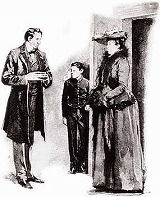“Some ten or twelve, but none which present any feature of interest. They are important, you understand, without being interesting. Indeed, I have found that it is usually in unimportant matters that there is a field for the observation, and for the quick analysis of cause and effect which gives the charm to an investigation. The larger crimes are apt to be the simpler, for the bigger the crime the more obvious, as a rule, is the motive. In these cases, save for one rather intricate matter which has been referred to me from Marseilles, there is nothing which presents any features of interest. It is possible, however, that I may have something better before very many minutes are over, for this is one of my clients, or I am much mistaken.”
He had risen from his chair and was standing between the parted blinds, gazing down into the dull neutral-tinted London street. Looking over his shoulder, I saw that on the pavement opposite there stood a large woman with a heavy fur boa round her neck, and a large curling red feather in a broad-brimmed hat which was tilted in a coquettish Duchess of Devonshire fashion over her ear. From under this great panoply she peeped up in a nervous, hesitating fashion at our windows, while her body oscillated backward and forward, and her fingers fidgeted with her glove buttons. Suddenly, with a plunge, as of the swimmer who leaves the bank, she hurried across the road, and we heard the sharp clang of the bell.
“I have seen those symptoms before,” said Holmes, throwing his cigarette into the fire. “Oscillation upon the pavement always means an affaire de coeur. She would like advice, but is not sure that the matter is not too delicate for communication. And yet even here we may discriminate. When a woman has been seriously wronged by a man she no longer oscillates, and the usual symptom is a broken bell wire. Here we may take it that there is a love matter, but that the maiden is not so much angry as perplexed, or grieved. But here she comes in person to resolve our doubts.”

As he spoke there was a tap at the door, and the boy in buttons entered to announce Miss Mary Sutherland, while the lady herself loomed behind his small black figure like a full-sailed merchant-man behind a tiny pilot boat. Sherlock Holmes welcomed her with the easy courtesy for which he was remarkable, and, having closed the door and bowed her into an armchair, he looked her over in the minute and yet abstracted fashion which was peculiar to him.
“Do you not find,” he said, “that with your short sight it is a little trying to do so much typewriting?”
“I did at first,” she answered, “but now I know where the letters are without looking.” Then, suddenly realizing the full purport of his words, she gave a violent start and looked up, with fear and astonishment upon her broad, good-humoured face. “You’ve heard about me, Mr. Holmes,” she cried, “else how could you know all that?”
“Never mind,” said Holmes, laughing; “it is my business to know things. Perhaps I have trained myself to see what others overlook. If not, why should you come to consult me?”
“I came to you, sir, because I heard of you from Mrs. Etherege, whose husband you found so easy when the police and everyone had given him up for dead. Oh, Mr. Holmes, I wish you would do as much for me. I’m not rich, but still I have a hundred a year in my own right, besides the little that I make by the machine, and I would give it all to know what has become of Mr. Hosmer Angel.”
“Why did you come away to consult me in such a hurry?” asked Sherlock Holmes, with his finger-tips together and his eyes to the ceiling.